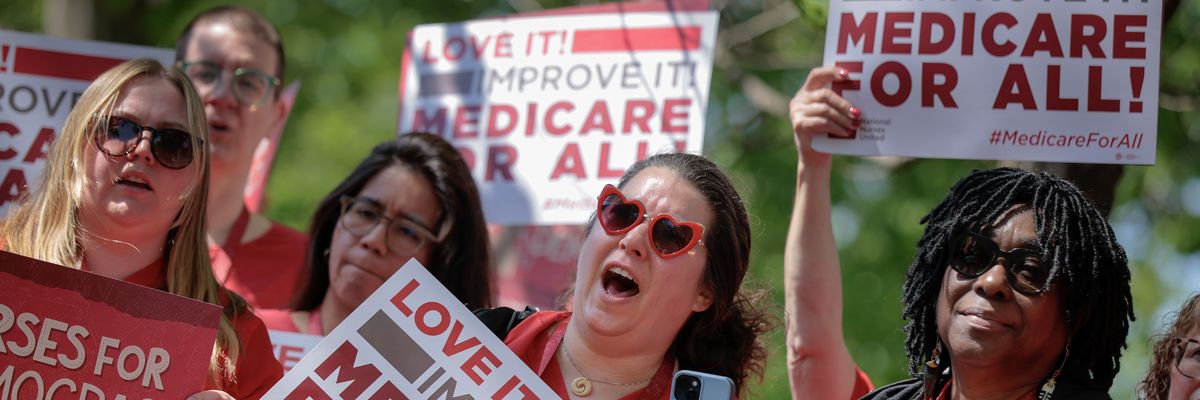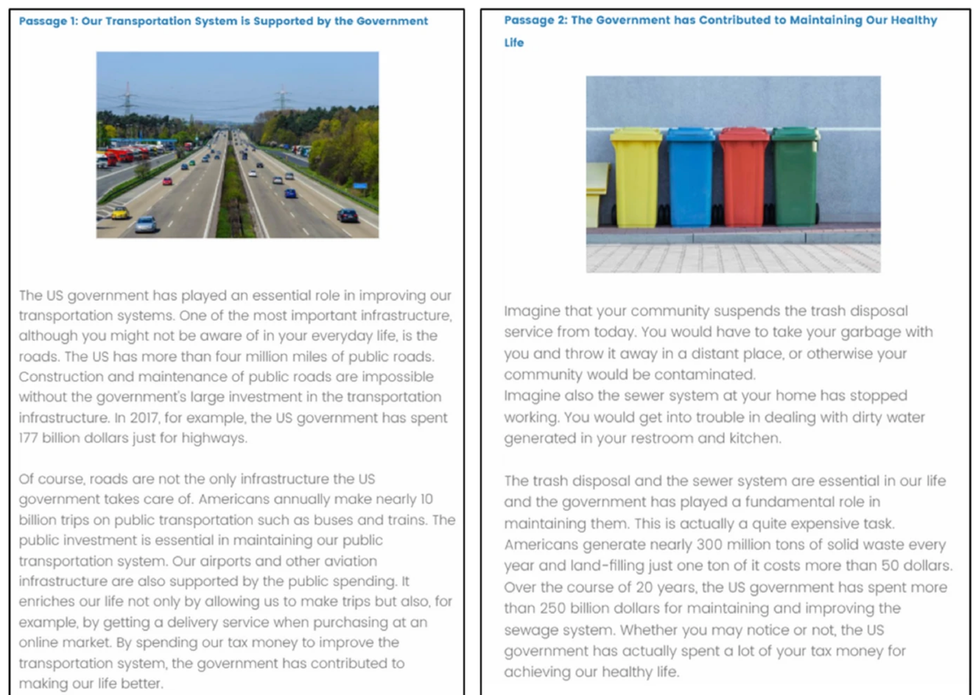
Members of National Nurses United rally with lawmakers to show their support for the Medicare For All on April 29, 2025 in Washington, DC.
Americans More Supportive of Higher Taxes Once Informed of 'Universal Benefits of Public Goods': Study
Researchers found that informing people of the benefits of taxpayer-funded goods and services significantly boosted public opinion of larger government, spending, and taxation.
A new study challenges the common assumption that Americans are preternaturally averse to higher taxation, showing that public attitudes become more favorable once people are made aware of the "universal benefits of public goods" funded by their tax dollars.
The study, conducted by Japanese researchers and published last month in the Japanese Economic Review, separated the US-based participants into a treatment group and a control group.
People in both groups were asked questions about their views on government size, spending, and taxation, but those in the treatment group were provided passages explaining the universal benefits of tax-funded transportation systems, public roads, trash disposal, and sewage infrastructure.
Researchers intentionally crafted the passages to highlight the benefits of universal goods, not means-tested programs targeted at low-income Americans.
Before and after reading the above passages, participants in the treatment group were asked: "How much of your taxes do you think are used for public goods and services that benefit all of you?"
They were also asked whether they agree with the following statement: "Regardless of income, everyone in the US more or less benefits from public spending."
The researchers found that the treatment passages substantially increased support for public spending, larger government, and higher taxes among study participants.
After consuming the provided information on the benefits of public goods, nearly 64% of those in the treatment group said they would support an across-the-board tax increase of 1%. In the control group, support was significantly lower at 52.5%.
"If people become aware that more public goods are provided than they previously thought, the government might politically achieve more redistribution through expanding its size without reducing policy progressivity," the study authors wrote. "Although we focused on transportation and trash disposal systems, governments provide other public goods. Exploring how our results may or may not generalize to other public goods would be interesting."
The study was published amid a growing national debate over the for-profit US healthcare system, with Democrats pushing for an extension of tax credits that help millions of Americans afford private insurance plans while Republicans float vague and unworkable alternatives.
Congressional progressives, for their part, have used the healthcare fight to elevate their case for Medicare for All, the only plan on offer that would secure universal healthcare—and at a lower overall cost than the status quo.
Opponents of Medicare for All—which would eliminate premiums, copays, and deductibles—have balked at the taxes Americans would have to pay to fund comprehensive health coverage for everyone in the United States.
But the Japanese Economic Review study suggests that US public opinion on taxes is malleable, particularly when people are informed of the benefits of universal programs.
An Urgent Message From Our Co-Founder
Dear Common Dreams reader, The U.S. is on a fast track to authoritarianism like nothing I've ever seen. Meanwhile, corporate news outlets are utterly capitulating to Trump, twisting their coverage to avoid drawing his ire while lining up to stuff cash in his pockets. That's why I believe that Common Dreams is doing the best and most consequential reporting that we've ever done. Our small but mighty team is a progressive reporting powerhouse, covering the news every day that the corporate media never will. Our mission has always been simple: To inform. To inspire. And to ignite change for the common good. Now here's the key piece that I want all our readers to understand: None of this would be possible without your financial support. That's not just some fundraising cliche. It's the absolute and literal truth. We don't accept corporate advertising and never will. We don't have a paywall because we don't think people should be blocked from critical news based on their ability to pay. Everything we do is funded by the donations of readers like you. Will you donate now to help power the nonprofit, independent reporting of Common Dreams? Thank you for being a vital member of our community. Together, we can keep independent journalism alive when it’s needed most. - Craig Brown, Co-founder |
A new study challenges the common assumption that Americans are preternaturally averse to higher taxation, showing that public attitudes become more favorable once people are made aware of the "universal benefits of public goods" funded by their tax dollars.
The study, conducted by Japanese researchers and published last month in the Japanese Economic Review, separated the US-based participants into a treatment group and a control group.
People in both groups were asked questions about their views on government size, spending, and taxation, but those in the treatment group were provided passages explaining the universal benefits of tax-funded transportation systems, public roads, trash disposal, and sewage infrastructure.
Researchers intentionally crafted the passages to highlight the benefits of universal goods, not means-tested programs targeted at low-income Americans.
Before and after reading the above passages, participants in the treatment group were asked: "How much of your taxes do you think are used for public goods and services that benefit all of you?"
They were also asked whether they agree with the following statement: "Regardless of income, everyone in the US more or less benefits from public spending."
The researchers found that the treatment passages substantially increased support for public spending, larger government, and higher taxes among study participants.
After consuming the provided information on the benefits of public goods, nearly 64% of those in the treatment group said they would support an across-the-board tax increase of 1%. In the control group, support was significantly lower at 52.5%.
"If people become aware that more public goods are provided than they previously thought, the government might politically achieve more redistribution through expanding its size without reducing policy progressivity," the study authors wrote. "Although we focused on transportation and trash disposal systems, governments provide other public goods. Exploring how our results may or may not generalize to other public goods would be interesting."
The study was published amid a growing national debate over the for-profit US healthcare system, with Democrats pushing for an extension of tax credits that help millions of Americans afford private insurance plans while Republicans float vague and unworkable alternatives.
Congressional progressives, for their part, have used the healthcare fight to elevate their case for Medicare for All, the only plan on offer that would secure universal healthcare—and at a lower overall cost than the status quo.
Opponents of Medicare for All—which would eliminate premiums, copays, and deductibles—have balked at the taxes Americans would have to pay to fund comprehensive health coverage for everyone in the United States.
But the Japanese Economic Review study suggests that US public opinion on taxes is malleable, particularly when people are informed of the benefits of universal programs.
A new study challenges the common assumption that Americans are preternaturally averse to higher taxation, showing that public attitudes become more favorable once people are made aware of the "universal benefits of public goods" funded by their tax dollars.
The study, conducted by Japanese researchers and published last month in the Japanese Economic Review, separated the US-based participants into a treatment group and a control group.
People in both groups were asked questions about their views on government size, spending, and taxation, but those in the treatment group were provided passages explaining the universal benefits of tax-funded transportation systems, public roads, trash disposal, and sewage infrastructure.
Researchers intentionally crafted the passages to highlight the benefits of universal goods, not means-tested programs targeted at low-income Americans.
Before and after reading the above passages, participants in the treatment group were asked: "How much of your taxes do you think are used for public goods and services that benefit all of you?"
They were also asked whether they agree with the following statement: "Regardless of income, everyone in the US more or less benefits from public spending."
The researchers found that the treatment passages substantially increased support for public spending, larger government, and higher taxes among study participants.
After consuming the provided information on the benefits of public goods, nearly 64% of those in the treatment group said they would support an across-the-board tax increase of 1%. In the control group, support was significantly lower at 52.5%.
"If people become aware that more public goods are provided than they previously thought, the government might politically achieve more redistribution through expanding its size without reducing policy progressivity," the study authors wrote. "Although we focused on transportation and trash disposal systems, governments provide other public goods. Exploring how our results may or may not generalize to other public goods would be interesting."
The study was published amid a growing national debate over the for-profit US healthcare system, with Democrats pushing for an extension of tax credits that help millions of Americans afford private insurance plans while Republicans float vague and unworkable alternatives.
Congressional progressives, for their part, have used the healthcare fight to elevate their case for Medicare for All, the only plan on offer that would secure universal healthcare—and at a lower overall cost than the status quo.
Opponents of Medicare for All—which would eliminate premiums, copays, and deductibles—have balked at the taxes Americans would have to pay to fund comprehensive health coverage for everyone in the United States.
But the Japanese Economic Review study suggests that US public opinion on taxes is malleable, particularly when people are informed of the benefits of universal programs.


